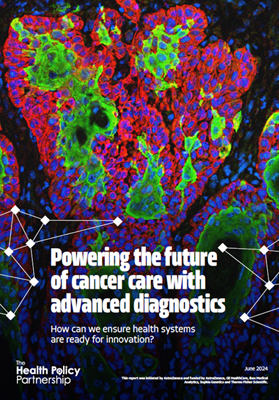Sample advocacy letter
This open letter template has been developed to help you call for change from local policy- and decision-makers with a unified voice.
Dear [representative’s name],
As [your constituent/other designation], I am writing to request your support in ensuring that health systems are ready to adopt advanced diagnostics, which could give people with cancer the best chance of survival.
Advanced diagnostics, which at the moment are largely available in clinical trials or specialist hospitals, could transform outcomes for people with cancer. These innovative technologies are providing more in-depth information on cancer than ever before. With this information, patients could receive earlier and more accurate diagnosis; be given highly tailored treatments; and suffer fewer severe side effects by avoiding treatments that are not likely to be effective.
These technologies may also bring significant benefits to health systems, and could include:
- fewer treatments being delivered that would not be effective, saving time and resources
- a reduction in hospitalisations from severe side effects associated with these treatments
- reduced costs, since cancers that are diagnosed earlier tend to be less expensive to treat
- efficiencies through greater use of automation.
While advanced diagnostics could bring significant benefits, it is critical that we prepare our health systems, and prevent the existing inequalities in cancer care and outcomes from widening.
To find out more, please read the report Powering the future of cancer care with advanced diagnostics: How can we ensure health systems are ready for innovation? The report outlines clear actions for policy- and decision-makers.
Please join me in recognising the crucial role advanced diagnostics could play in improving the lives of people with cancer and their families, and the urgent need to address the barriers that prevent many people with cancer from benefitting. Your actions as an MEP have the potential to transform cancer outcomes.
I look forward to your response, and I hope to speak with you soon.
Yours sincerely,
[SIGNATURE]
[Name]
This project was initiated by AstraZeneca and funded by AstraZeneca, GE HealthCare, Ibex Medical Analytics, Sophia Genetics and Thermo Fisher Scientific.





